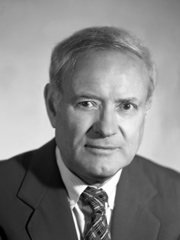Paolo Volponi facts for kids
Quick facts for kids
Paolo Volponi
|
|
|---|---|
 |
|
| Personal details | |
| Born | February 6, 1924 Urbino, Italy |
| Died | August 23, 1994 (aged 70) Ancona, Italy |
| Alma mater | University of Urbino |
| Profession | Poet and writer |
Paolo Volponi (born February 6, 1924, in Urbino, Italy – died August 23, 1994, in Ancona, Italy) was an Italian writer, poet, and politician. He is known for his novels that explored the changes in Italian society after World War II.
Contents
About Paolo Volponi
Early Life and Education
Paolo Volponi was born on February 6, 1924, in Urbino, a city in Italy. When he was 19, in 1943, he joined the Italian partisans. These were groups of people who fought against the German occupation and the fascist government in Italy during World War II.
After the war, he studied law at Urbino University. He finished his studies and graduated in 1947.
Career and Politics
Volponi's writing career was greatly shaped by a meeting in 1950. He met Adriano Olivetti, a smart businessman who owned the Olivetti factory. Volponi started working for Olivetti, first as an assistant, then as the director of social services. This job involved looking after the well-being of the factory workers.
In 1972, he moved to Turin to work for Fiat, a large car company. He became the president of the Fondazione Agnelli in 1975. However, he had to leave this position because he openly supported the Italian Communist Party. This political party aimed for a society where wealth was shared more equally.
Later, in 1983, Paolo Volponi was elected to the Italian Senate. This is one of the two houses of the Italian Parliament, where laws are made. He served as a politician while also continuing his writing.
Paolo Volponi passed away on August 23, 1994.
His Important Books
Paolo Volponi wrote many books, including poems and novels. His stories often looked at the problems in Italian society as industries grew quickly after World War II. He created unique and imaginative fictional worlds in his books.
Early Poetry and Novels
His first collection of poems, Il ramarro, came out in 1948. He won the Viareggio Prize in 1960 for another poetry book called Le porte dell'Appennino.
His first novel, Memoriale (published in 1962), tells the story of a working man. It shows how life in a factory and society can lead to feelings of being alone and even to mental struggles.
Award-Winning Works
In 1965, Volponi won the famous Strega Prize for his novel La macchina mondiale. This book features a sad main character, a farmer-philosopher. People have described him as one of the most confusing and touching characters in Italian stories of that time.
He won the Viareggio Prize again in 1975 for his novel Il sipario ducale. This book returned to a more traditional storytelling style. It was set against the background of a bomb attack that happened in Milan in 1969.
Volponi also won the Mondello Prize in 1986 for his book Con testo a fronte.
Later Novels and Themes
In Corporale (1974), Volponi wrote about a former communist thinker. This character becomes very worried about nuclear war. He builds a shelter, hoping to survive and live closer to nature after the war ends.
Il pianeta irritabile (1978) is an allegorical story. This means it uses characters and events to represent deeper ideas. It's set in the year 2293. Four characters – a baboon, an elephant, a goose, and a dwarf – escape a big explosion. They search for a safe place, facing many dangers and battles. The story suggests that everything might be pointless, making it a thought-provoking read.
Il lanciatore di giavellotto (1981) paints a memorable picture of a troubled teenage boy named Dami. Many compare this character to the famous Holden Caulfield from The Catcher in the Rye.
His novel Le mosche del capitale (1989) follows the journey of an industrialist who is also a poet. It shows his rise and fall in the business world.
Finally, with La strada per Roma (1991), Paolo Volponi made history. He became one of only two Italian writers to win the Strega Prize twice.
See also
 In Spanish: Paolo Volponi para niños
In Spanish: Paolo Volponi para niños
 | Georgia Louise Harris Brown |
 | Julian Abele |
 | Norma Merrick Sklarek |
 | William Sidney Pittman |

